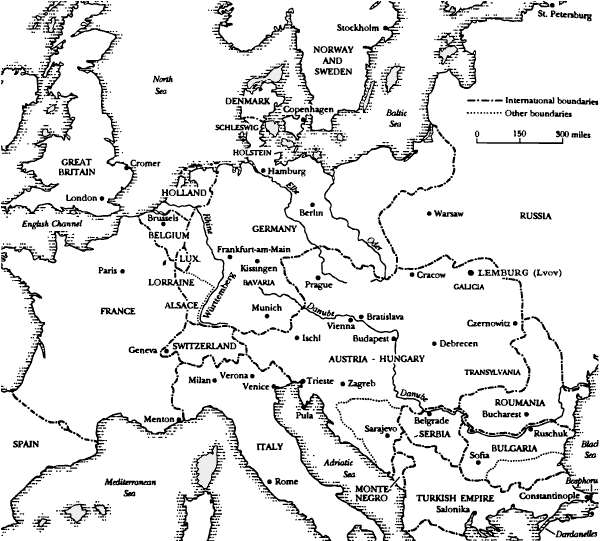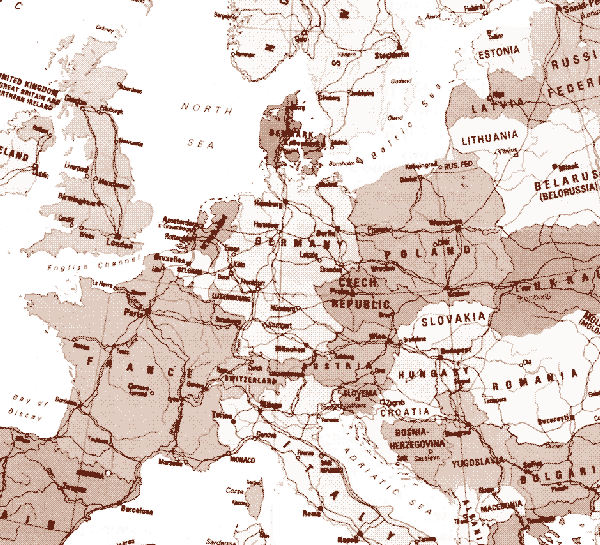|
Loading
|
|
|
The Rise and Fall of the Austro-Hungarian Empire
- cAD 10
- Romans take over the Celtic settlement at Vindobona; later fortify it and raise it to the status of municipium, a city with the privileges of Roman citizenship.
- c455
- Barbarian invaders settle in area now known as Austria.
- 795
- Charlemagne conquers the Avars and brings Austria within the boundaries of the empire.
- 1156
- Austria becomes a duchy, with Vienna as residence of its ruler, Heinrich Jasomirgott of Babenberg. Construction of St Stefan's Cathedral begins.
- 1221
- Municipal and trading privileges granted to Vienna by Duke Leopold VI of Babenberg.
- 1246
- Death of Frederick the Warrior brings Babenberg dynasty to an end. He is succeeded by Ottokar II, King of Bohemia who starts construction of Vienna's Hofburg Palace.
- 1278
- Emperor Rudolf of Habsburg defeats King Ottkar on the Marchfeld, gains Vienna and makes it his capital.
- 1365
- University of Vienna founded by Duke Rudolf IV
- 1493
- Maximillian elected Holy Roman Emperor as Maximillian I.
- 1496
- Philip, son of Emperor Maximillian I, marries Joanna of Castille, heiress to Spain.
- 1498
- Emperor Maximillian I founds court choristers, forerunners of Vienna Boys Choir.
- 1526
- Louis II Jagellon, King of Bohemia and Hungary, dies fighting the Turks at battle of Mohacs. His brother-in-law, Archduke Ferdinand of Austria, is elected King of Bohemia and Hungary, marking the start of Habsburg domination in Central Europe.
- 1529
- First unsuccessful siege of Vienna by the Turks under Suleiman the Magnificent.
- 1572
- Emperor Maximillian II founds the Spanish Riding School.
- 1620
- Battle of White Mountain, outside Prague, confirms authority of Habsburgs in Central Europe. Protestants expelled from Bohemia and Moravia.
- 1683
- Second siege of Vienna by Turks under Grand Vizier, Kara Mustafa, ends in rout of the Turks by combined German and Polish armies. Habsburg reconquest of Hungary begins under Charles of Lorraine and Eugene of Savoy.
- 1723
- Palaces of Lower and Upper Belvedere completed for Prince Eugene of Savoy.
- 1740
- Maria Theresa ascends Habsburg throne at age of 23. Wars against Frederick the Great of Prussia begin, embroiling Europe for more than 20 years.
- 1749
- Schonbrunn Palace completed by Nicholas Pacassi.
- 1780-90
- Reforming Emperor Josef II rules in Vienna, granting patent of religious tolerance and freedom of the press.
- 1791
- Mozart dies in Vienna, unmourned.
- 1805
- Vienna occupied by the French after battle of Austerlitz is won by Napoleon's forces.
- 1806
- Dissolution of Holy Roman Empire. Its last Emperor, Francis II, restyles himself Francis I of Austria.
- 1809
- Habsburg forces defeat French at Aspern and are then defeated by the French at Wagram. Composer Joseph Haydn dies in Vienna during second French occupation of the city.
- 1814-15
- At Congress of Vienna, statesmen of Austria, Russia, Prussia and Great Britain redraw map of Europe after Napoleonic Wars.
- 1815-48
- Prince Metternich, successively Foreign Minister and Chancellor of Austria, suppresses Liberal Activists. Biedermeier art flourishes.
- 1827
- Beethoven dies and is buried in Wahring cemetery at edge of city.
- 1848
- During spring revolution, Metternich and Habsburgs flee from Vienna. In Autumn Habsburg forces bombard city and regain power. Franz Josef becomes Emperor.
- 1857
- Franz Josef decrees demolition of medieval walls and fortifications make way for the Ringstrasse development.
- 1867
- Austrian Empire restyled as Austro-Hungarian Empire. Johann Strauss composes 'The Blue Danube'.
- 1869
- Opera House, first public building on the Ring, inaugurated with performance of Mozart's Don Giovanni.
- 1881
- Construction of new wing of Hofburg Palace begins.
- 1889
- Archduke Rudolf, heir to the throne, commits suicide at Mayerling.
- 1897
- Giant Ferris wheel erected in Prater park. Gustav Mahler becomes Director of Vienna Opera, remaining in post for 10 years.
- 1902
- Sigmund Freud becomes professor at University of Vienna. 1906-13 Adolf Hitler lives in Vienna as poor student and labourer.
- 1906
- Annexation of Bosnia-Herzogovina, last Habsburg acquisition, generates renewed tension in Balkans.
- 1914
- Archduke Franz Ferdinand, heir to Habsburg throne, assassinated at Sarajevo by Bosnian student. Emperor Franz Josef signs declaration of war against Serbia, precipitating First World War.
- 1916
- Franz Josef dies and is succeeded by his great-nephew, Archduke Charles.
- 1918
- End of First World War and collapse of Habsburg Monarchy. At Schonbrunn Charles renounces the throne, bringing to an end more than 600 years of Habsburg rule. Socialist Karl Renner becomes first Chancellor of Austrian Republic.
- 1920-34
- 64,000 workers' flats built by municipality of Vienna.
- 1934
- At climax of clashes between Left and Right, Chancellor Englebert Dollfuss suppresses socialists, but is assassinated by Austrian Nazis.
- 1938
- Hitler annexes Austria. Many socialists and Jews flee Vienna.
- 1945
- Vienna bombed and Austria occupied by Allies at end of Second World War. Establishment of Second Republic.
- 1955
- State Treaty signed restoring Austrian independence. Rebuilt Opera House opens with performance of Beethoven's Fidelio.
- 1969
- Socialist Bruno Kreisky becomes Chancellor. Strategic Arms Limitation Talks open in Vienna. Construction of Vienna's underground railway begins.
- 1973
- Building of United Nations City, an office complex for 4,500 members of UN staff, gets under way.
- 1986
- After speculation about his war record Kurt Waldheim elected President.
- 1995
- Austria joins EEC.


From the programme of A Patriot for Me. Books consulted or quoted from include: The Dissolution of the Austro-Hungarian Empire 1867-1918, John W Mason (Longman, 1985); A History of the Habsburg Empire 1526-1918, Robert A Kann (University of California Press, 1974); Twilight of the Habsburgs, Alan Palmer (Weidenfeld and Nicolson, 1994); Vienna, Vienna: The Golden Age, William M Johnston (Clarkson Potter, 1981); Vienna's Golden Autumn 1866-1938, Hilde Spiel (Weidenfeld and Nicolson, 1987; The Panther's Feast, Robert Asprey (Jonathan Cape, 1959);